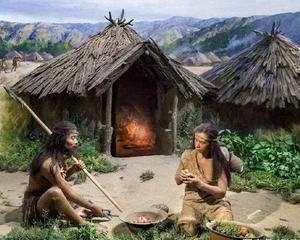He becomes a sower, a reaper, a spinner, a weaver, a baker, a brewer, a distiller, a dyer, a carpenter; and whilst he is these, he bends the pliant stems of his tropical forests into roof-trees and rafters, and clothes them with leaves, and makes for himself a tabernacle of boughs, and so is the arch-architect of a second great school of architecture; and, by-and-by, his twisted branches and interlaced leaves grow into Grecian columns with Corinthian acanthus capitals, and Gothic pillars, with petrified plants and stony flowers gracefully curling round them.
野蛮人逐渐变成了农民、织工、面包师、酿酒家、染工和木匠。他们用热带雨林里柔韧的树枝建造屋顶和椽子、用树叶裹体、为自己搭建树屋,就如同二流建筑学校里的拱建筑师所做的那样。随着时间的流逝,树枝和树叶变成了带有科林斯式柱头装饰的希腊圆柱和哥特式支柱,柱上有奇特的植物和冷峻的花儿优雅地缠绕攀附。

Once more: in those temperate regions where large animals and trees do not greatly abound, turfs, or mud, or clay, or stones, or all together, can be fashioned into that outermost garment which we call a house, and which we most familiarly connect with the notion of architecture.
然而,在没有大型动物生活、也没有大量树木生长的温带地区,却可以用草皮、地泥和石头混在一起搭建最外层的保护壳——我们称之为房屋,这和我们再熟悉不过的建筑学概念紧密相关。
It is not, however, his cultivation either of the arts which have been named, or of others, that makes man peculiar as an industrial animal; —it is the mode in which he practises them. The first step he takes towards remedying his nakedness and helplessness, is in a direction in which no other creature has led the way, and none has followed his example. He lays hold of that most powerful of all weapons of peace or war, Fire, from which every other animal, unless when fortified by man's presence, flees in terror; and with it alone not only clothes himself, but lays the foundation of a hundred arts.
不过,这和将人类变成独特工业动物的所谓艺术或者其它才艺的培养并无关联,这只是人类将它们付诸实践的方式。为了不让自己赤身裸体,为了能延续生存,人类开辟了一条没有任何其他生物走过、也没有任何其他生物效仿的路。人类拥有了掌控一切和平与战争的强大武器——火,其他生物除非和人类结盟,否则只能落荒而逃。有了火,人类不只是不再赤身裸体,同时还奠定了人类自身百年艺术的基础。














